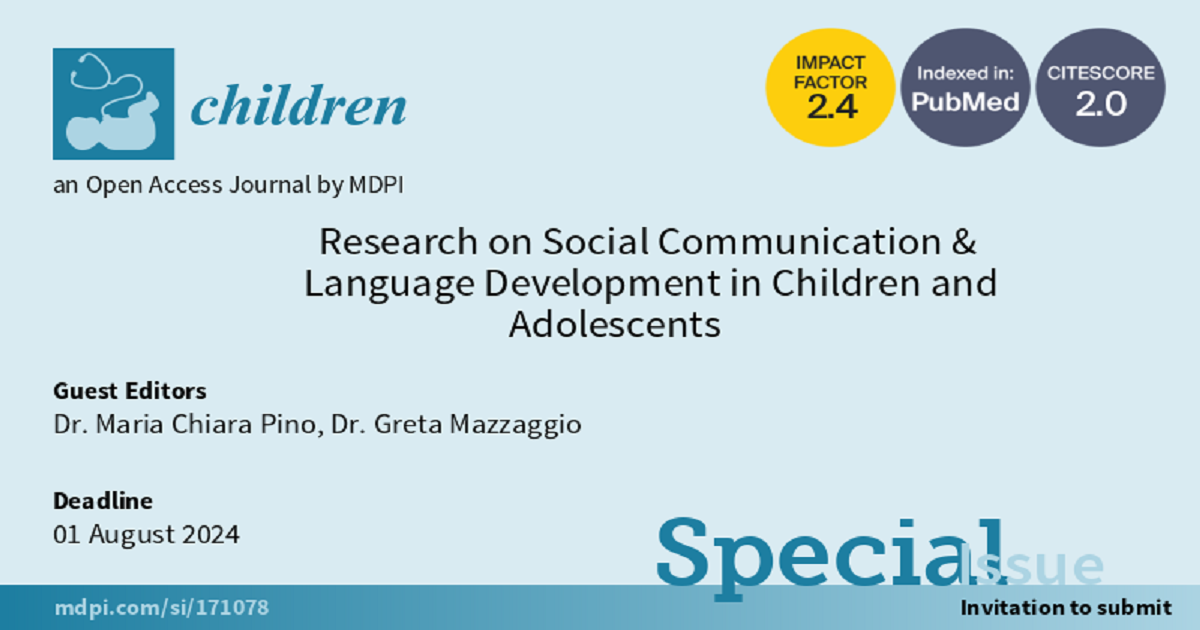Research on Social Communication & Language Development in Children and Adolescents
A special issue of Children (ISSN 2227-9067). This special issue belongs to the section "Pediatric Neurology & Neurodevelopmental Disorders".
Deadline for manuscript submissions: closed (1 August 2024) | Viewed by 7098

Special Issue Editors
Interests: socio-emotional abilities; typical and atypical development; autism spectrum disorder
Special Issue Information
Dear Colleagues,
Language in children is spontaneous and largely autonomous and it plays a central role in social interaction, with a reciprocal relationship between language and social communication. For this reason, a delay in language development can represent an alarm bell for specific neurodevelopmental disorders. In addition, language disorders could impair the development of more complex abilities such as social communication that is reliant upon certain language features, including adapting language use to the listener or situation and adhering to conversational and storytelling rules. These rules can vary across cultures and individuals and are often implicit, making it challenging to navigate different social situations. Children with language difficulties may struggle with using social communication and having social interactions effectively.
This Special Issue aims to explore the factors that can impact the relationship between language and social communication in the early stage of life, including protective and risk factors. Studies on the development of these abilities will be welcome. The Special Issue welcomes both original research (using qualitative, quantitative, or mixed-methods approaches) and reviews.
Dr. Maria Chiara Pino
Guest Editor
Dr. Greta Mazzaggio
Guest Editor Assistant
Manuscript Submission Information
Manuscripts should be submitted online at www.mdpi.com by registering and logging in to this website. Once you are registered, click here to go to the submission form. Manuscripts can be submitted until the deadline. All submissions that pass pre-check are peer-reviewed. Accepted papers will be published continuously in the journal (as soon as accepted) and will be listed together on the special issue website. Research articles, review articles as well as short communications are invited. For planned papers, a title and short abstract (about 100 words) can be sent to the Editorial Office for announcement on this website.
Submitted manuscripts should not have been published previously, nor be under consideration for publication elsewhere (except conference proceedings papers). All manuscripts are thoroughly refereed through a single-blind peer-review process. A guide for authors and other relevant information for submission of manuscripts is available on the Instructions for Authors page. Children is an international peer-reviewed open access monthly journal published by MDPI.
Please visit the Instructions for Authors page before submitting a manuscript. The Article Processing Charge (APC) for publication in this open access journal is 2400 CHF (Swiss Francs). Submitted papers should be well formatted and use good English. Authors may use MDPI's English editing service prior to publication or during author revisions.
Keywords
- social communication
- language development
- social abilities
- children
- adolescents
- developmental language disorders
- communicative and linguistic interaction
Benefits of Publishing in a Special Issue
- Ease of navigation: Grouping papers by topic helps scholars navigate broad scope journals more efficiently.
- Greater discoverability: Special Issues support the reach and impact of scientific research. Articles in Special Issues are more discoverable and cited more frequently.
- Expansion of research network: Special Issues facilitate connections among authors, fostering scientific collaborations.
- External promotion: Articles in Special Issues are often promoted through the journal's social media, increasing their visibility.
- Reprint: MDPI Books provides the opportunity to republish successful Special Issues in book format, both online and in print.
Further information on MDPI's Special Issue policies can be found here.






